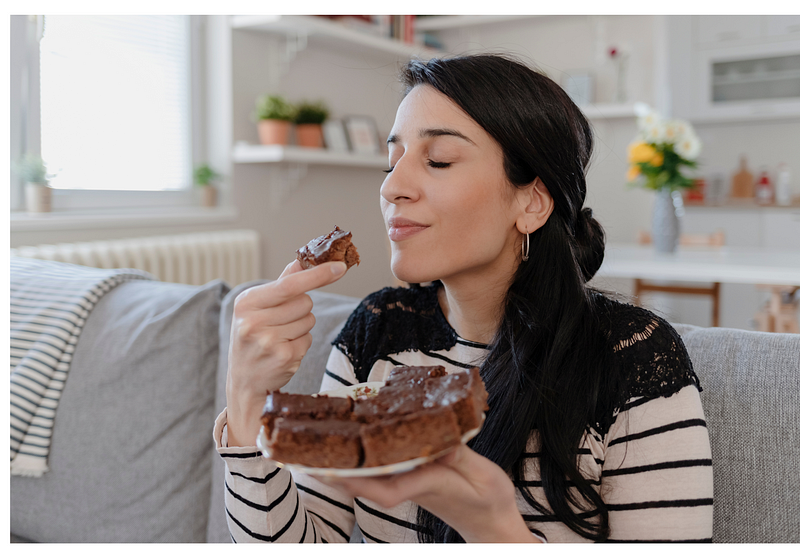Understanding the Link Between Gut Bacteria and Your Sweet Cravings
Written on
Chapter 1: The Gut-Brain Connection
It turns out that my urge to polish off an entire package of cookies isn't solely due to indulgent cravings. Many of you can relate—one minute you’re nibbling on a few Nutter Butters, and before you know it, the whole box is gone. My relentless desire for sweets is like a clock ticking away, leaving my family puzzled as to why I keep desserts out of the house. The answer is straightforward: I simply can't resist them. As Benjamin Hardy suggests, willpower can be overrated; our surroundings play a crucial role in our choices.
A groundbreaking study from Caltech has revealed that a lack of certain gut bacteria may lead to excessive cravings for sugary treats. Previously, I had only a whimsical Mary Poppins tune to blame for my sweet tooth.
Just a spoonful of sugar helps the medicine go down.
Song by Julie Andrews
YOUR GUT MICROBIOME MAY BE INFLUENCING YOUR EATING HABITS
Recent research published in Current Biology indicates that the absence of specific gut bacteria causes mice to binge on palatable foods—those consumed for enjoyment rather than hunger or nutrition. The Caltech team, including researchers like James Ousey and Sarkis Mazmanian, has shown that our gut microbiome significantly impacts our behavior, and altering this microbiome can change our eating habits. Perhaps adjusting my gut flora could help alleviate my constant cravings for snacks from the convenience store.
Mazmanian emphasizes, “The recent findings that feeding behaviors influenced by motivation are affected by gut microbiome composition have implications not only for cravings for sweets but also for obesity, diabetes, and other metabolic disorders, as well as for substance use.”
Section 1.1: The Role of Antibiotics
Antibiotics might be a significant factor in these cravings. The research indicates that mice with disrupted gut microbiota from antibiotics consumed 50% more sugar pellets in a two-hour span compared to those with normal gut bacteria, even though both groups had the same regular diet.
Ousey administered antibiotics for four weeks to eliminate the mice's gut bacteria. The study found that ampicillin and vancomycin were particularly effective in altering the mice's microbiota, leading them to seek out more palatable foods.
Mice with these modified microbiomes exerted more effort to obtain sugar pellets. In an experiment, they had to push a lever to receive sugar, and as they acquired more pellets, the number of lever pushes required increased. Mice without antibiotics soon lost interest, while those that had received antibiotics kept pushing the lever tirelessly for more sugar.
Subsection 1.1.1: The Power of Fecal Transplants

GOOD NEWS! The binge-eating behavior observed in the mice could be reversed. By restoring their microbiota through a fecal transplant, the mice resumed normal feeding habits. Although they still enjoyed sugar, they no longer exhibited the same overeating tendencies.
The team discovered that increased levels of specific bacteria, such as S24–7 and Lactobacillus, were linked to reduced binge eating. Ousey found it intriguing to consider whether humans treated with antibiotics might also display changes in their eating habits and choices, especially since individuals with eating disorders often have distinct gut microbiota compared to those without such issues.
As Mazmanian notes, “Future research will examine the gut-brain connection in regulating reward pathways in the brain and the potential use of probiotics to address eating disorders.”
Chapter 2: Probiotics and Eating Behavior
Video title: Salari's Bakery: Chocolate Chip Brownies - YouTube
The concept that our microbiomes can influence food addiction and binge eating was explored in a study conducted by the NIH. In this randomized, double-blind, placebo-controlled trial, 50 patients received a probiotic for ninety days after bariatric surgery, while another group received a placebo. Evaluations were conducted before and after surgery, as well as at ninety days and one year post-op, using the Yale Food Addiction Scale (YFAS) and Binge Eating Scale (BES) to assess outcomes.
One year later, the probiotic group showed a significant reduction in symptoms of food addiction and binge eating compared to the placebo group. The probiotic strain that exhibited these effects contained Lactobacillus acidophilus NCFM and Bifidobacterium lactis Bi-07—bacteria that also played a role in the Caltech study.
In conclusion, aside from considering a fecal transplant, taking a probiotic—especially one rich in Lactobacillus—following antibiotic treatment may help curb those cravings for sweets. Who knows, it might just prevent you from demolishing that bag of M&M’s!
Annie